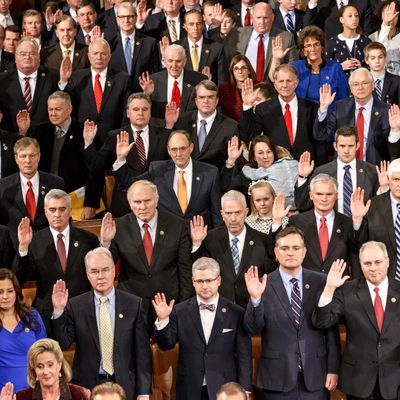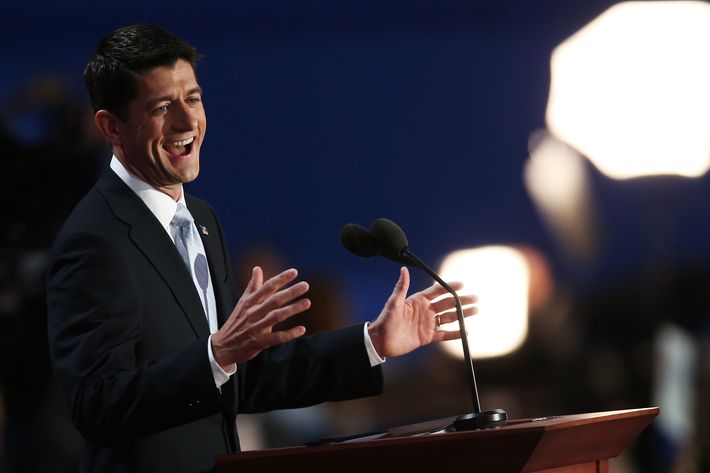
The first substantive act of the new, all-Republican Congress was a telling one: House and Senate leaders, now in partisan accord and able to impose an undiluted partisan imprint upon the institution, struck a blow in their decades-long struggle on behalf of low taxes for the rich and against the bookkeeping standards that have stood in their way. In a rapid vote yesterday, the House directed the Congressional Budget Office to use “dynamic scoring” — a Washington term of art to describe imposing conservative ideology upon the once-neutral task of measuring the budgetary impact of legislation.
The Congressional Budget Office is a 40-year-old institution that has acquired enormous clout within Washington by virtue of its reputation for ideological neutrality. It furnishes Congress and the public with budgetary estimates that, if necessarily imperfect (as all predictions must be), are arrived at fairly. It is also a perfect modern expression of an old Progressive Era–ideal: that policymakers should be informed by the work of impartial experts. That the conservative majority has set out to corrupt this institution as one of its first major acts is, therefore, perfectly fitting.
The old methods CBO used to measure legislation would account for changes in behavior that a new law might create. (Say, higher cigarette taxes would lead to less smoking.) They did not attempt to measure legislation’s impact on the economy as a whole. This is because the two parties disagree completely over what policies make the economy grow faster. Democrats, for instance, believe that tax rates on the rich have little effect on economic growth, but that investing in public infrastructure or education has a lot. Republicans believe the opposite. Congress voted yesterday to require the CBO’s measurement of the budgetary cost of legislation to incorporate assumptions about how it will affect economic growth. Specifically, the GOP’s assumptions.
To understand the stakes of the disagreement, consider the following. In 2012, President Obama was threatening to block any extension of the Bush tax cuts for the highest earners, and he made this promise a key point of differentiation between himself and Mitt Romney. The Congressional Budget Office predicted that the expiration of these tax cuts would have only minor, short-term effects on the economy. Conservatives made far more dire assessments. A study commissioned by pro-business organizations predicted that ending the Bush tax cuts for the rich would cost hundreds of thousands of jobs and reduce economic productivity. “This report shows the president’s small business tax hike threatens hundreds of thousands of jobs, and will lead to even less economic growth, less investment and lower wages for American workers,” warned John Boehner. “These tax increases will have painful impacts on the economy and job creation,” insisted the Heritage Foundation. These predictions were the perfectly predictable expression of the conservative worldview, which deems tax rates on “job creators” to be the overriding factor in the success or failure of the economy.
Almost nothing that has happened in the two years since has made that conservative argument look good. In February 2013 — just after the Bush tax cuts on the highest earners expired — the Congressional Budget Office published a forecast for the budget and the economy over the next several years. The CBO forecast that the unemployment rate would fall to 7.6 percent by the end of 2014. If the conservative analysis was correct, and higher tax rates on job creators were depressing job growth, we might expect the unemployment rate today to be higher than the CBO forecast. Instead it is much lower. Unemployment fell below 6 percent by the third quarter of last year. Indeed, the economy appears to be accelerating into a phase of more rapid growth just at the time conservatives predicted that higher taxes would have the opposite effect. This development has not given Republicans even the slightest pause.

The whole reason the Republican Congress is instituting dynamic scoring comes as a response to its attempt to write a tax reform bill last year. The idea was to lower tax rates while eliminating loopholes and preferences. But Republicans discovered that, while lowering rates is easy, eliminating preferences is hard. After Representative Dave Camp produced a tax reform bill that failed to cut tax rates for high-income taxpayers enough for their liking, Republicans abandoned it en masse. Paul Ryan openly declared his plan to change the forecasting rules so that Republicans could cut tax rates without having to pay for every dollar by ending preferences. The first step was kicking out Douglas Elmendorf, the CBO director widely respected by both sides. The second step was yesterday’s vote.
“Dynamic scoring” allows the Republican majority to impose its own ideological terms on the process of scoring legislation. Many credible economic forecasters would argue that debt-financed tax cuts actually reduce economic growth, and thereby cost the government more, not less, than their static cost. (For instance, a paper by the Brookings Institution concludes that the Bush tax cuts slightly reduced economic growth, because the negative impact of higher debt outweighed the positive incentive impact of lower rates.)
Indeed, two decades’ worth of experience would point toward the same conclusion. When Bill Clinton raised the top tax rates, conservatives predicted it would trigger another recession. Instead the economy boomed. When George W. Bush reduced the top tax rates, conservatives predicted it would usher in new heights of prosperity. Instead the economy produced a tepid recovery that was itself inflated by a bubble, culminating in a devastating collapse. The current recovery has picked up speed after the Bush tax cuts for the rich expired. These events do not prove that cutting taxes for the rich causes economic decay and that raising them causes growth. They do suggest that tax rates on the rich have, at best, extremely little impact on underlying growth rates. Republicans are enshrining their doctrine into congressional law at a moment when real-world evidence on its behalf is at a low ebb.
The new, “dynamic” CBO will be systematically biased to make conservative proposals appear misleadingly cheap and liberal proposals misleadingly costly to the public fisc. This would be true even if the Republicans were soliciting a fair range of forecasting perspectives. By its design, the dynamic scoring rule allows the party in power to game its effects. It applies “dynamic scoring” only to legislation affecting 0.25 percent of Gross Domestic Product. As Chye-Ching Huang and Paul Van de Water point out, congressional leaders can manipulate this requirement easily: They can break up large pieces of legislation into smaller bills to avoid dynamic scoring, or combine smaller pieces into a major bill, if needed to make their agenda appear more affordable. Dynamic scoring is subject to abuse by its very design.
It is possible the Republicanized CBO continues to function in some distorted form, advancing Republican legislative goals by passing off slanted analysis as impartial. Or it is possible it simply loses all of its previous credibility and mutates into another partisan mouthpiece. Either way, the Republican right has struck a powerful blow against the sort of academic expert they have always loathed.






























